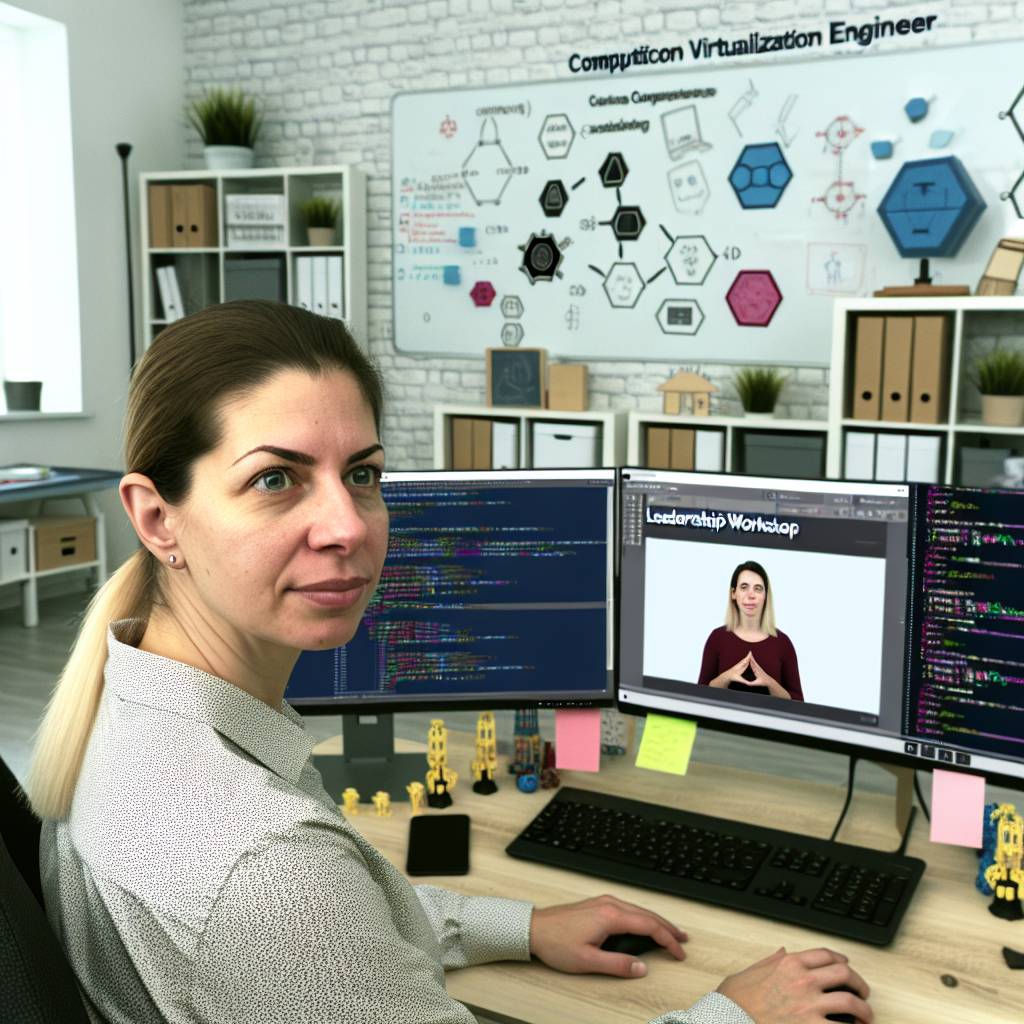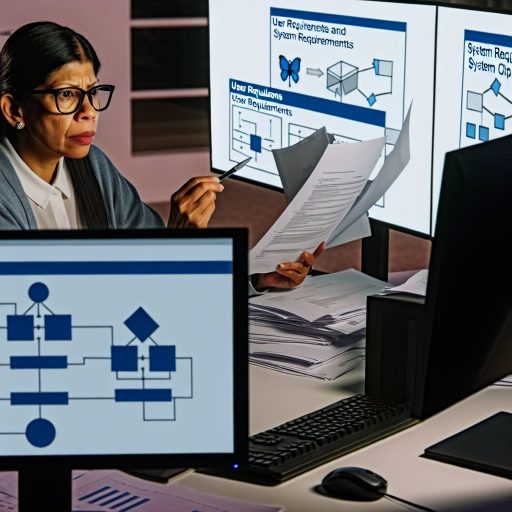Introduction:
Soft skills play a crucial role in the success of a virtualization engineer.
These non-technical skills encompass communication, teamwork, and problem-solving abilities.
Developing soft skills can enhance a virtualization engineer’s career.
These enhancements improve collaboration with team members, clients, and stakeholders.
Effective communication and interpersonal skills are essential in bridging the gap between technical solutions and business needs.
Understanding the role of a virtualization engineer:
Virtualization engineers are responsible for designing, implementing, and managing virtualized environments.
They work with virtual machines, hypervisors, and storage to create efficient and scalable IT infrastructures.
Virtualization engineers need to understand complex networking concepts and troubleshoot virtualization issues effectively.
They play a crucial role in optimizing IT resources, reducing costs, and improving overall system performance.
Being proficient in virtualization technologies such as VMware, Hyper-V, and Citrix is essential for virtualization engineers.
They must stay updated with the latest trends and technologies in the field to ensure they can meet business needs effectively.
Importance of Soft Skills in Virtualization Engineering:
Soft skills in virtualization engineering are crucial for success in the industry because they enhance communication.
These skills allow virtualization engineers to effectively collaborate with team members and clients.
Soft skills also aid in problem-solving, critical thinking, and decision-making within virtualized environments.
In a fast-paced and dynamic field like virtualization engineering, the ability to adapt and communicate effectively is key.
Strong soft skills help virtualization engineers build relationships, manage conflicts, and work efficiently with diverse teams.
Virtualization engineers with good soft skills can easily convey complex technical information to non-technical stakeholders.
Effective communication skills enable engineers to translate business requirements into technical solutions accurately.
How Soft Skills Complement Technical Expertise in the Role:
Technical expertise alone is not sufficient for virtualization engineers to succeed in their roles.
Soft skills like communication, teamwork, and problem-solving enhance and complement technical knowledge.
Transform Your Career Today
Unlock a personalized career strategy that drives real results. Get tailored advice and a roadmap designed just for you.
Start NowThe ability to communicate technical concepts clearly to non-technical stakeholders is essential for project success.
Strong interpersonal skills enable virtualization engineers to work effectively with cross-functional teams and departments.
Soft skills help engineers manage conflicts, negotiate solutions, and build consensus within the organization.
Virtualization engineering projects often require collaboration with different departments, making soft skills indispensable.
The combination of technical know-how and soft skills sets virtualization engineers apart in a competitive industry.
Soft skills improve customer relations, team dynamics, and overall project execution in virtualization engineering.
See Related Content: IT Security Manager vs. CISO: Key Differences
Communication skills:
Clear and effective communication plays a crucial role in the field of virtualization engineering.
As a virtualization engineer, you need to convey complex technical information to various stakeholders, including team members, clients, and other departments.
Effective communication ensures that everyone is on the same page and understands the project requirements and objectives.
Here are some tips on improving communication skills both verbally and in writing:
-
Active Listening: One of the key components of effective communication is active listening. Make sure to listen attentively to others’ perspectives and ideas before responding.
-
Clarity and Conciseness: When conveying information, whether it’s in person or in writing, be clear and concise. Avoid using technical jargon that may confuse non-technical team members.
-
Empathy: Understanding and empathizing with others’ viewpoints can help you communicate more effectively. Put yourself in their shoes to better comprehend their needs and concerns.
-
Ask for Feedback: Don’t be afraid to ask for feedback on your communication style. Constructive criticism can help you identify areas for improvement and enhance your communication skills.
-
Practice Active Communication: Engage in regular communication with your team members, clients, and stakeholders. Keep them updated on project progress and be open to feedback and suggestions.
-
Use Visual Aids: Sometimes, complex technical information is better conveyed through visual aids such as diagrams, charts, or presentations. Visual aids can help simplify complex concepts and improve understanding.
-
Improve Writing Skills: Whether you’re drafting emails, reports, or project documentation, strong writing skills are essential. Brush up on grammar, punctuation, and clarity to ensure your written communication is effective.
-
Be Mindful of Tone: In both verbal and written communication, be mindful of your tone. Avoid being curt or dismissive, and strive to communicate in a positive and professional manner.
-
Build Relationships: Establishing strong relationships with your colleagues and clients can facilitate better communication. Invest time in building rapport and trust, as this can lead to smoother communication and collaboration.
-
Seek Communication Training: If you feel that your communication skills need improvement, consider seeking communication training or workshops. These resources can provide you with practical strategies and techniques to enhance your communication abilities.
Explore Further: ERP Consultant Success Stories
Collaboration and Teamwork
Collaboration is crucial in virtualization projects.
Teamwork enhances productivity and creativity in tasks.
Sharing knowledge and skills with colleagues fosters growth.
Importance of Collaboration
- Collaboration leads to a broader perspective on projects.
- It allows for the pooling of expertise and resources.
- Promotes a supportive and inclusive work environment.
Strategies for Effective Teamwork
- Clear communication channels are essential for teamwork.
- Establishing common goals and objectives for the team.
- Recognizing and appreciating each team member’s contribution.
Fostering Positive Relationships
- Building trust and respect among team members.
- Encouraging open and honest communication within the team.
- Resolving conflicts constructively and in a timely manner.
Impact of Collaboration on Project Success
Collaboration and teamwork are vital for success in virtualization projects.
Developing soft skills in this area can lead to more efficient and effective project outcomes.
By implementing strategies and fostering positive relationships, virtualization engineers can enhance their professional development.
Discover More: Machine Learning in Healthcare: Engineer’s Role
Problem-solving skills:
One of the most important skills for a virtualization engineer is strong problem-solving abilities.
Transform Your Career Today
Unlock a personalized career strategy that drives real results. Get tailored advice and a roadmap designed just for you.
Start NowVirtualization technology is complex and often presents unique challenges that need to be resolved quickly and efficiently.
Address the need for strong problem-solving abilities in virtualization engineering:
- Highlight the importance of being able to identify and troubleshoot issues in virtualized environments.
- Emphasize the impact that effective problem-solving skills can have on the overall performance and stability of virtualized systems.
- Discuss how the ability to think critically and analytically is crucial in resolving complex technical problems.
Offer techniques for developing critical thinking and analytical skills to solve complex issues:
- Encourage virtualization engineers to practice logical reasoning and deductive thinking to break down problems into manageable parts.
- Suggest engaging in regular brainstorming sessions with colleagues to explore different approaches to problem-solving.
- Propose seeking out training opportunities and certifications that focus on enhancing problem-solving skills in virtualization engineering.
- Recommend staying up-to-date with the latest virtualization technologies and best practices to better understand and address emerging challenges.
By honing their problem-solving skills, virtualization engineers can become more efficient in diagnosing and resolving issues, ultimately enhancing the performance and reliability of virtualized systems.
You Might Also Like: Enterprise Architect Interview Questions and Answers

Adaptability and Flexibility:
Highlight the importance of being adaptable and flexible in a rapidly evolving field like virtualization.
Offer advice on how to embrace change and quickly learn new technologies.
Adapting to change is a fundamental skill for success in the field of virtualization.
As technology continues to evolve at a rapid pace, virtualization engineers must be able to quickly pivot and adjust to new developments.
This requires a high level of adaptability and flexibility.
One key aspect of being adaptable is having a growth mindset.
This means approaching challenges with an open mind and a willingness to learn.
Virtualization engineers should be proactive in seeking out new opportunities for growth and development, whether through training courses, online resources, or hands-on experience.
Embracing change also means being open to trying new technologies and methodologies.
Virtualization engineers should continuously seek to expand their knowledge and skill set, even if it means stepping out of their comfort zone.
This willingness to experiment and innovate can lead to new insights and solutions in the field of virtualization.
Another important aspect of adaptability is being able to work effectively in diverse and rapidly changing environments.
Virtualization engineers often collaborate with teams from different backgrounds and regions and must be able to quickly adapt to new working styles and cultural norms.
Flexibility in communication and collaboration is key to building strong working relationships and achieving project success.
Adaptability and flexibility are essential soft skills for virtualization engineers.
By embracing change, learning new technologies quickly, and working effectively in diverse environments, virtualization engineers can stay ahead of the curve in this rapidly evolving field.
Time management and organization:
Efficient time management and organization skills are crucial for meeting project deadlines.
Transform Your Career Today
Unlock a personalized career strategy that drives real results. Get tailored advice and a roadmap designed just for you.
Start NowTo improve time management, consider using tools like calendars, to-do lists, and project management software.
Prioritizing tasks effectively is essential to ensure the completion of critical project components on time.
Break down complex projects into smaller tasks and allocate specific timeframes for each to avoid overwhelm.
Set realistic deadlines for each task and ensure they align with the overall project timeline.
Regularly review and update your task list to stay on track and adjust priorities as needed.
Consider using time tracking tools to monitor how you are spending your time and identify areas for improvement.
Eliminate distractions during work hours by setting boundaries, such as turning off notifications and managing interruptions effectively.
Establish a routine that allows you to allocate dedicated time blocks for specific tasks or projects.
Learn to delegate tasks when necessary to free up time for more critical aspects of your work.
Importance of Soft Skills for Virtualization Engineers
Developing soft skills is crucial for virtualization engineers to thrive in their careers.
Such skills enhance communication, teamwork, and problem-solving abilities.
These capabilities are essential in the field of virtualization.
By honing these skills, virtualization engineers can differentiate themselves from their peers.
This differentiation can lead to professional advancement in the industry.
Additional Resources
Information Technology (IT) < George Mason University
A research agenda for augmented and virtual reality in architecture …




